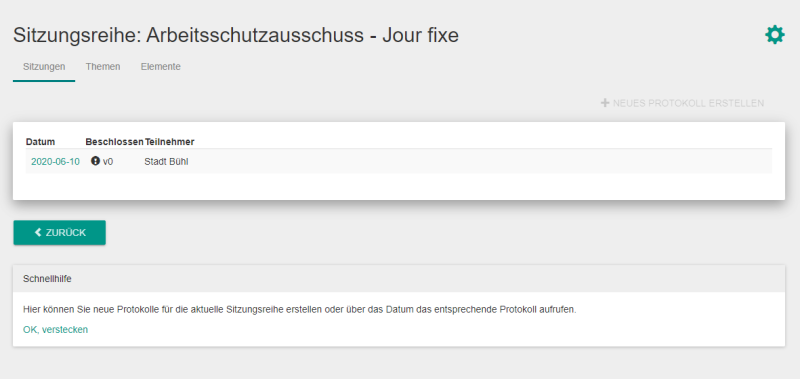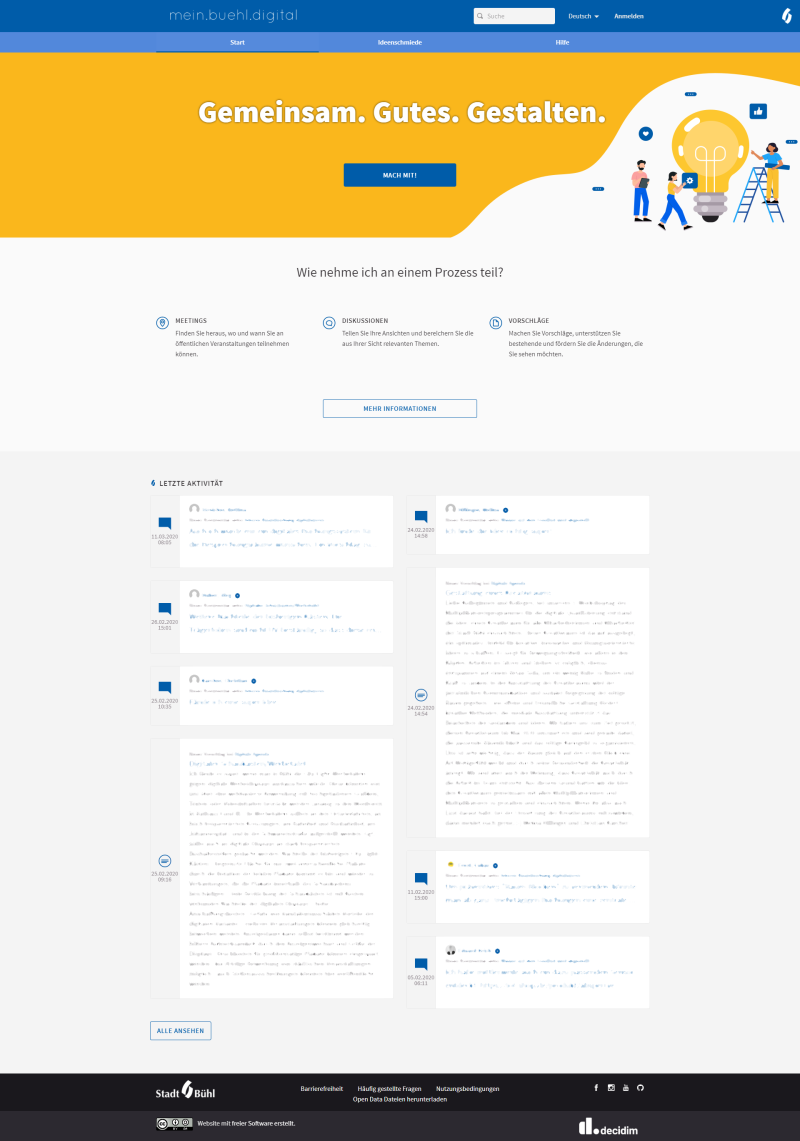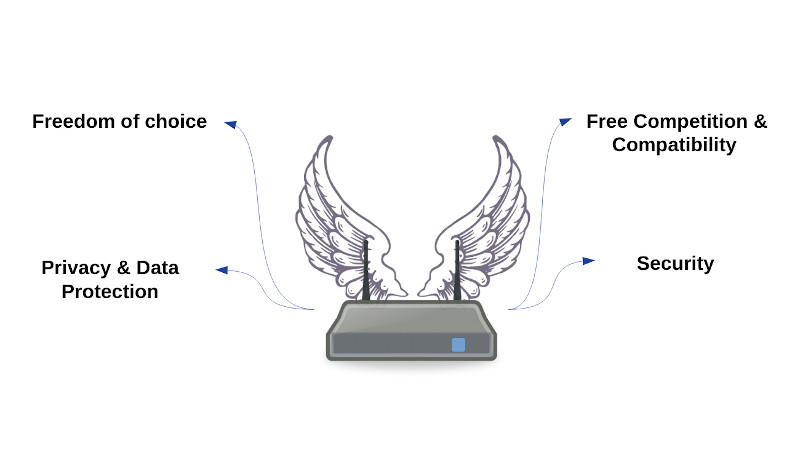The public sector of Bühl uses Free Software
The town of Bühl, Germany, has started the successful Free Software based video conference platform “Palim! Palim!”. To find out more about the relations between Bühl and Free Software we conducted an interview with Eduard Itrich, the digitisation officer from the town of Bühl.
The town of Bühl, in the south-west of Germany, started a video conference platform, called “Palim! Palim!” based on the Free Software “Jitsi Meet” to ease the effects of the COVID-19 lock-down for their citizens. “Palim! Palim!” quickly became a striking success; the citizens were thrilled with it and also other municipalities started to became interested. But “Palim! Palim!” is not the only Free Software project used and maintained by the town of Bühl. To find out more about the background behind “Palim! Palim!” and what other relations the town of Bühl has with Free Software we conducted this interview with the “Chief Digital Officer,” Eduard Itrich, from the public administration of Bühl.
FSFE: Mr. Itrich, can you quickly introduce yourself and the town of Bühl, and explain what a “Digitalisierungsbeauftragter” is?
Eduard Itrich: First of all I would like to thank you very much for this interview. I have been following the work of FSFE e.V. for many years now and I am all the more thankful for the opportunity to talk to you directly. My name is Eduard Itrich, I am 31 years old and after my studies of mathematics I first worked as a Linux software developer. As you can see, Free Software has always been an integral part of my profession. After my two-year parental leave to look after my two twin daughters, I started working for the town of Bühl as a "digitisation officer" at the end of last year. Characteristic of the town of Bühl is its diversity. Located in the south-west of Germany between the Rhine plain, vineyards and the Black Forest, the large district town with almost 30,000 inhabitants offers numerous criteria that make the community liveable and lovable. An extremely diverse range of associations, excellent childcare facilities, an active community of retailers, lively church communities and very committed citizens speak for the quality of life on site, as do the town's measures in urban development, climate protection and, of course, digitisation.
Perhaps the position of digitisation officer is more familiar to some under the title of "Chief Digital Officer". Essentially, it is about consolidating a digitisation strategy and orchestrating the digital transformation both within and outside the town administration. I deal with topics such as eGovernment and Smart City, as well as Open Data, and within the town hall of course also with the automation of existing administrative processes.

You recently introduced a video platform “Palim! Palim!” - can you explain the use case and what “Palim! Palim!” exactly is?
We have developed an open video conferencing platform, based on the Free Software “Jitsi Meet”, called “Palim! Palim!”. This offers video telephony to all Bühl citizens at no charge and, of course, beyond the town limits. We support families, groups of friends, associations, initiatives, and also companies in their efforts to be able to meet digitally in an uncomplicated and low-threshold manner. It does not require more than an up-to-date browser to stay in touch. No need to register or collect sensitive metadata. Since the launch of our platform at the beginning of April, we have seen many interesting use cases: for example, the digital children's leisure program for doing handicrafts together or the long-awaited reunion between nursing home residents and their families.
“We have developed an open video conferencing platform, based on the Free Software “Jitsi Meet,” called “Palim! Palim!”. This offers video telephony to all Bühl citizens at no charge and, of course, beyond the town limits.”
How did the idea behind “Palim! Palim!” start?
The idea of a video conferencing platform of our own was originally born out of the desire to continue to offer group lessons at the municipal music school during the Corona pandemic. Due to free capacities we decided in the further course of the project to make the platform available to all citizens. Today, we are very proud to have taken this courageous step and note that some very new discussions about digital sovereignty and services of general interest in the digital age have developed.
Why did you choose Jitsi Meet for “Palim! Palim!”?
The Free Software project "Jitsi Meet" was exactly the software we were looking for. It offers a very easy access for our target group to video conferencing, is easy to administer and the active community quickly finds a solution to any problems that may arise. Furthermore, we had the possibility to customise the software exactly according to our ideas, for example to include the urban design.
What difference does it make if you use Free Software, or not?
Especially the option to customise the software at will gave us the opportunity to create our own individual video conferencing solution for the city. We are convinced that exactly this local reference and the associated trust has contributed significantly to the success of the platform. At the same time, Free Software gives us the opportunity to think about the protection of personal data and the privacy of our users right from the design process. We can make a conscious decision for data economy and against the integration of unnecessary trackers. And last but not least, the very active community of Jitsi Meet was a good support for the implementation of an instance of our own. There was no problem we could not find a solution for in the forums or channels.
"Free Software gives us the opportunity to think about the protection of personal data and the privacy of our users right from the design process."
How was the feedback on “Palim! Palim!” so far?
Amazing! At no time did we expect such a great response. Many citizens express their personal thanks to us and we have stopped counting how many municipalities have approached us with great interest. I believe that Free Software is currently experiencing an incredible boost and that the sensitivity for data sovereignty is growing rapidly.
Are there any other Free Software projects you and your department are working on, or are you contributing to other Free Software projects?
We had been searching for a long time for a simple solution to make the minutes of meetings and discussions available to all participants in a bundled form and to be able to track important tasks. With the Free Software project "4Minitz!" we found a strong candidate that met almost all our requirements. The only catch: the interface was completely in English at that time and there was a risk of insufficient acceptance within the various specialist offices. With a total of more than 11,000 lines of changes to the code base, we initiated the development of internationalisation and localisation. It is very important to us not only to use Free Software, but also to give something back to the community. By now 4Minitz! can be used in 18 different languages.

You also use “decidim”. Could you explain what it is used for?
Our approach to digitisation is not to simply dictate it from the top down without any involvement. We want all employees to be able to express themselves - especially reservations or criticism of new solutions or offers. In the course of this we were looking for a suitable participation platform. Again, we found what we were looking for in a Free Software project. With the "decidim" framework, we were able to very quickly set up an internal participation and suggestion portal that promotes direct exchange within our administration. With "decidim", the digitisation team, which is distributed across all offices, can now easily bundle and discuss ideas and make internal decision-making processes transparent for all employees.

"Again, we found what we were looking for in a Free Software project."
What made you choose “decidim”?
A central component of decidim is the networking of online discussions with analogue meetings on site. This means that we can easily transfer suggestions and ideas into a meeting and present the results of this meeting transparently on the platform. This healthy mix of online and offline formats is, in our opinion, the key to a successful participation platform.
Do you use “decidim” only for internal communication or also for public communication with the citizens?
At present, unfortunately only for internal idea management, but we are firmly planning to provide an open participation platform for all citizens based on decidim.
What are the hurdles and what would need to be improved before you could use “decidim” for public communication with the citizens?
From a technical point of view the framework is great and again a strong community is worth its weight in gold. However, the mainly machine-made translation into German is rather unsuitable for a public operation. But here too, we are currently planning another bold step and are considering a crowdfunding campaign to finance a professional translation. You may remain curious!
Would you encourage other municipalities to also use Free Software?
Absolutely! The additional time required at the beginning of a Free Software based project may be a deterrent. But the long-term effect outweighs the initial investment. With a strong community behind you, the further development of the project and support for your own implementation are guaranteed.
"With a strong community behind you, the further development of the project and support for your own implementation are guaranteed."
What would you say are the three main advantages of using Free Software in the public administration?
We see the main advantages of Free Software in its full adaptability, data sovereignty, and the strengthening of the public good through collaborative development. In particular, the last point ensures that the project is not only developed further in terms of marketability, but also that the security and maintainability of the code base is ensured.
Final tip: What is a good start for a public administration to go for Free Software?
Start with something new and do not try to completely replace an existing system as a first step. You are looking for a new digital solution or want to launch a new offer? Free Software first! With this little reminder in mind, I am sure that your first Free Software based project can be a success.
We are looking forward to the future use and implementation of Free Software in Bühl's public sector. Thank you very much for this very interesting interview!
Questions asked for FSFE: Bonnie Mehring
The "Public Money? Public Code!" initiative aims to set Free Software as the standard for publicly financed software. The Free Software Foundation Europe together with over 190 civil society organisations and more than 28.000 individuals signed the open letter. We will use the signatures to contact decision makers and political representatives all over Europe and convince them to make public code the standard. You are invited to add your signature to make a bigger impact on
publiccode.eu.
Support FSFE


 "Again, we found what we were looking for in a Free Software project."
"Again, we found what we were looking for in a Free Software project."
 Quelques-un des nombreux bénéfices de la Liberté des Routeurs.
Quelques-un des nombreux bénéfices de la Liberté des Routeurs.

